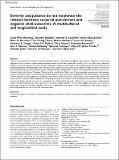| dc.contributor.author | Liane Peña Alampay, Jennifer Godwin, Jennifer E Lansford, Anna Silvia Bombi, Marc H Bornstein, Lei Chang, Kirby Deater-Deckard, Laura Di Giunta, Kenneth A Dodge, Patrick S Malone, Paul Oburu, Concetta Pastorelli, Ann T Skinner, Emma Sorbring, Sombat Tapanya, Liliana M Uribe Tirado, Arnaldo Zelli, Suha M Al-Hassan, Dario Bacchini | |
| dc.date.accessioned | 2020-08-05T08:28:43Z | |
| dc.date.available | 2020-08-05T08:28:43Z | |
| dc.date.issued | 2017-07 | |
| dc.identifier.citation | 36 | en_US |
| dc.identifier.uri | https://repository.maseno.ac.ke/handle/123456789/1826 | |
| dc.description | The article can also be accessed via URL;https://journals.sagepub.com | en_US |
| dc.description.abstract | There is strong evidence of a positive association between corporal punishment and negative child outcomes, but previous studies have suggested that the manner in which parents implement corporal punishment moderates the effects of its use. This study investigated whether severity and justness in the use of corporal punishment moderate the associations between frequency of corporal punishment and child externalizing and internalizing behaviors. This question was examined using a multicultural sample from eight countries and two waves of data collected one year apart. Interviews were conducted with 998 children aged 7–10 years, and their mothers and fathers, from China, Colombia, Italy, Jordan, Kenya, Philippines, Thailand, and the United States. Mothers and fathers responded to questions on the frequency, severity, and justness of their use of corporal punishment; they also reported on the externalizing and internalizing behavior of their child. Children reported on their aggression. Multigroup path models revealed that across cultural groups, and as reported by mothers and fathers, there is a positive relation between the frequency of corporal punishment and externalizing child behaviors. Mother-reported severity and father-reported justness were associated with child-reported aggression. Neither severity nor justness moderated the relation between frequency of corporal punishment and child problem behavior. The null result suggests that more use of corporal punishment is harmful to children regardless of how it is implemented, but requires further substantiation as the study is unable to definitively conclude that there is no true interaction effect. | en_US |
| dc.publisher | Sage Publications | en_US |
| dc.subject | Corporal punishment, multicultural, moderation, severity of punishment, justness of punishment, externalizing problems, internalizing problems | en_US |
| dc.title | Severity and justness do not moderate the relation between corporal punishment and negative child outcomes: A multicultural and longitudinal study | en_US |
| dc.type | Article | en_US |

